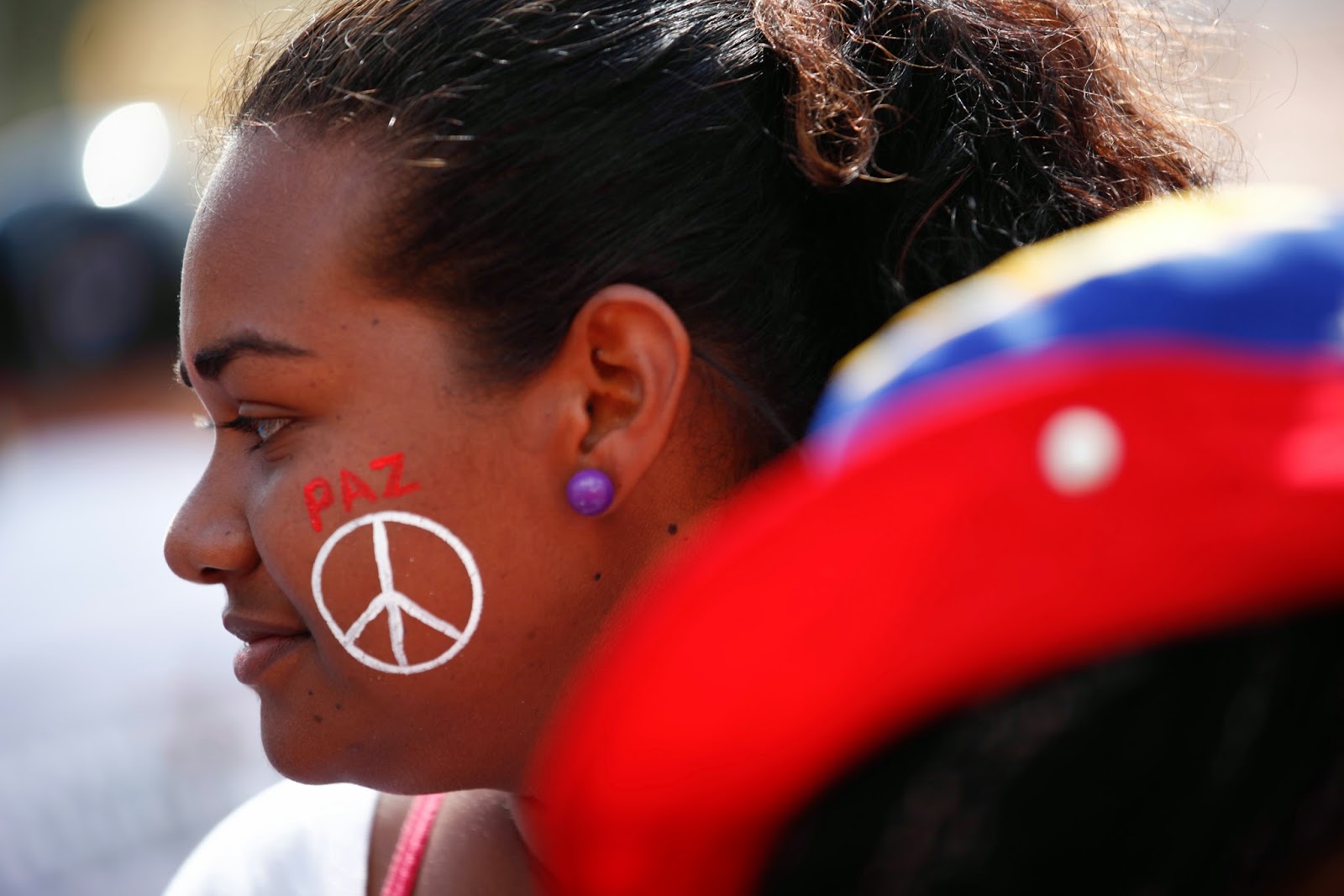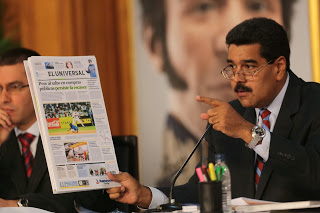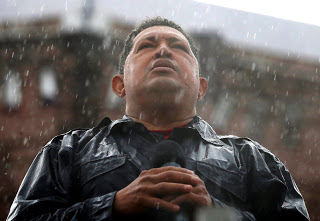By Eva Golinger
February 20, 2014
For those of you unfamiliar with Venezuelan
issues, don’t let the title of this article fool you. The revolution referred
to is not what most media outlets are showing taking place today in Caracas,
with protestors calling for the ouster of Venezuelan President Nicolas Maduro.
The revolution that is here to stay is the Bolivarian Revolution, which began
in 1998 when Hugo Chavez was first elected president and has subsequently
transformed the mega oil producing nation into a socially-focused, progressive
country with a grassroots government. Demonstrations taking place over the past
few days in Venezuela are attempts to undermine and destroy that transformation
in order to return power to the hands of the elite who ruled the nation previously
for over 40 years.
Those protesting do not represent Venezuela’s
vast working class majority that struggled to overcome the oppressive exclusion
they were subjected to during administrations before Chavez. The youth taking
to the streets today in Caracas and other cities throughout the country, hiding
their faces behind masks and balaclavas, destroying public buildings, vehicles,
burning garbage, violently blocking transit and throwing rocks and molotov
cocktails at security forces are being driven by extremist right-wing interests
from Venezuela’s wealthiest sector. Led by hardline neoconservatives, Leopoldo
Lopez, Henrique Capriles and Maria Corina Machado - who come from three of the
wealthiest families in Venezuela, the 1% of the 1% - the protesters seek not to
revindicate their basic fundamental rights, or gain access to free healthcare
or education, all of which are guaranteed by the state, thanks to Chavez, but
rather are attempting to spiral the country into a state of ungovernability
that would justify an international intervention leading to regime change.
Before Chavez was elected in 1998, Venezuela
was in a very dark, difficult period with a dangerously eroded democracy.
During the early 1990s, poverty swelled at around 80%, the economy was in a
sinkhole, the nation’s vast middle class was disappearing with millions falling
into economic dispair, constitutional rights were suspended, a national curfew
was imposed and corruption was rampant. Those who protested the actions of the
government were brutally repressed and often killed. In fact, during the period
of so-called “representative democracy” in Venezuela from 1958-1998, before the
nation’s transformation into a participatory democracy under Chavez, thousands
of Venezuelans were disappeared, tortured, persecuted and assassinated by state
security forces. None of their rights were guaranteed and no one, except the
majority excluded poor, seemed to care. International Human Rights
organizations showed little interest in Venezuela during that time, despite
clear and systematic violations taking place against the people.
Those in power during that period, also
referred to in Venezuela as the “Fourth Republic”, represented an elite
minority - families that held the nation’s wealth and profited heavily from the
lucrative oil reserves. Millions of dollars from oil profits belonging to the
state (oil was nationalized in Venezuela in 1976) were embezzled out of the country
into the bloated bank accounts of wealthy Venezuelans and corrupt public
officials who had homes in Miami, New York and the Dominican Republic and lived
the high life off the backs of an impoverished majority.
Hugo Chavez’s electoral victory in 1998 shattered
the opulent banquet the Venezuelan elite had enjoyed for decades, while they
ran the country into the ground. He was elected precisely to break the hold on
power those groups had harnessed for so many years, and Chavez’s promise was
revolution - complete transformation of the economic, social and political
system in the country. His electoral victories were solid, year after year,
each time rising in popularity as more and more Venezuelans became motivated to
participate in their governance and the construction of a new, inclusive,
nation with social justice as its banner.
Chavez’s election was a huge blow to Washington
and the powerful interests in the United States that wanted control over
Venezuela’s oil reserves - the largest on the planet. In April 2002, the Bush
administration backed a coup d’etat to overthrow Chavez, led by the very same
elite that had been in power before. The coup involved mass marches in the
streets of Caracas, composed of the wealthy and middle classes, calling for
Chavez’s ouster. Snipers were used to shoot on those in the marches, creating
violence and chaos that was immediately blamed on Chavez. Television, radio and
newspapers in Venezuela all joined in the coup efforts, manipulating images and
distorting facts to justify Chavez’s overthrow. He became the villian, the evil
dictator, the brutal murderer in the eyes of international media, though in
reality those overthrowing him and their backers in Washington were responsible
for the death and destruction caused. After Chavez was kidnapped on April 11,
2002 and set to be assassinated, the wealthy businessmen behind the coup took
power and imposed a dictatorship. All democratic institutions were dissolved,
including the legistature and the supreme court.
The majority who had voted for Chavez and had
finally become protagonists in their own governance were determined to defend
their democracy and took to the streets demanding return of their president.
Forty-eight hours later, Chavez was rescued by millions of supporters and loyal
armed forces. The coup was defeated and the revolution survived, but the
threats continued.
A subsequent economic sabotage attemped to
bring down the oil industry. 18,000 high level technical and managerial workers
at the state-owned company, PDVSA, walked off the job, sabotaging equipment and
causing nearly $20 billion in damages to the Venezuelan economy. After 64 days
of strikes, barren supermarket shelves due to intentional hoarding to create
panic, and a brutal media war in which every private station broadcast
opposition propaganda 24/7, Venezuelans were fed up with the opposition.
Chavez’s popularity soared. A year and a half later, when the opposition tried
to oust him through a recall referendum, he won a 60-40 landslide victory.
Leading efforts to overthrow Chavez were the
very same three who today call for their supporters to take to the streets to
force current President Nicolas Maduro from power. Leopoldo Lopez and Henrique
Capriles were both mayors of two of Caracas’ wealthiest municipalities during
the 2002 coup - Chacao and Baruta, while Maria Corina Machado was a close ally
of Pedro Carmona, the wealthy businessman who proclaimed himself dictator
during Chavez’s brief ouster. Lopez and Machado signed the infamous “Carmona
Decree” dissolving Venezuela’s democratic institutions, trashing the
constitution. Both Capriles and Lopez were also responsible for persecuting and
violently detaining members of Chavez’s government during the coup, including
allowing some of them to be publicly beaten, such as Ramon Rodriguez Chacin,
former Minister of Interior in 2002.
All three have been major recipients of US
funding and political support for their endeavors to overthrow Chavez, and now
Maduro. The US National Endowment for Democracy (NED) and its offshoots, the
International Republican Institute (IRI) and the National Democratic Institute
(NDI) provided start-up funds for Machado’s NGO Sumate, and Capriles’ and
Lopez’s right-wing party Primero Justicia. When Lopez split from Primero
Justicia in 2010 to form his own party, Voluntad Popular, it was bankrolled by
US dollars.
Over the ten year period, from 2000-2010, US
agencies, including the US Agency for International Development (USAID) and its
Office for Transition Initiatives (OTI), set up in Caracas in 2002, channeled
more than $100 million dollars to opposition groups in Venezuela. The overall
objective was regime change.
When Chavez was reelected in 2006 with an even
larger margen of victory, nearly 64% of the vote, the US shifted its support
from the traditional opposition political parties and NGOs in order to create
new ones with youthful, fresh faces. Over one third of US funding, nearly $15
million annually by 2007, was directed towards youth and student groups,
including training in the use of social networks to mobilize political
activism. Student leaders were sent to the US for workshops and conferences on
Internet activism and media networking. They were formed in tactics to promote
regime change via street riots and strategic use of media to portray the
government as repressive.
In 2007, these student groups, funded and
trained by US agencies, took to the streets of Caracas to demand Chavez’s
ouster after the government chose not to renew the public concession of RCTV, a
popular private television station known for its seedy soap operas. The
protests were composed of mainly middle and upper class youth and opposition
politicians, defending corporate media and a station also known for its direct
involvement in the April 2002 coup. Though their protests failed to achieve
their objective, the “students” had earned their credentials as a solid fixture
in the opposition. Later that year, their organizing helped to narrowly defeat
a constitutional reform package Chavez had proposed in a national referendum.
After President Chavez passed away in March
2013 following a brutal battle with cancer, the opposition saw an opportunity
to snatch power back from his supporters. Elections were held on April 14, 2013
in an extremely tense and volatile environment. Nicolas Maduro, Chavez’s chosen
successor, ran against Henrique Capriles, who months earlier in October 2012
had lost the presidential election to Chavez by 11 points. This time, however,
the results were much narrower with Maduro winning by a slim margen of just
under 2 points. Capriles refused to accept the results and called his
supporters to take to the streets in protest, to “get all their rage out”.
During the two days after the elections, 11 government supporters were killed
by Capriles’ followers. It was a bloodbath that received no attention in
international media, the victims just weren’t glamorous enough, and were on the
wrong side.
As 2013 wore on, the economic crisis in the
country intensified and the old strategy of hoarding products to provoke
shortages and panic amongst the population was back again. Basic consumer
products disappeared from the shelves - toilet paper, cooking oil, powdered
milk, corn flour - staples needed for everyday life in Venezuela. Inflation
began to rise and speculation, price hikes, were rampant. While some of this
was related to government controls on foreign currency exchange to prevent
capital flight, a lot had to do with sabotage. A full economic war was underway
against Maduro’s government.
Problems persisted throughout the year and
discontent grew. But as the electoral period came around again in December, for
mayors, the United Socialist Party of Venezuela (PSUV) had sweeping victories.
242 out of 317 mayoralties were won by the PSUV, showing a solid majority of
the country still supported the government’s party.
Maduro called opposition governors and
newly-elected mayors to a meeting at the presidential palace in late December
in an attempt to dialogue and create a space to work together to improve the
situation in country. The meeting was generously received by a majority of
Venezuelans. Nevertheless, extremists, such as Machado and Lopez, saw the
meeting as a threat to their goal of ousting Maduro well before his term ended
in 2019. Once again they began to call for street protests and other actions
against his government.
In January 2014, as Venezuelans arrived back
from their Christmas vacations, economic difficulties continued. Maduro began
cracking down on businesses violating newly-enacted laws on price controls and
speculation. Towards the end of January, new measures were announced regarding
access to foreign exchange that many perceived as a devaluing of the national
currency, the bolivar. Sentiment built amongst opposition groups rejecting the
new measures and calls for Maduro’s resignation increased. By February, small
pockets of protests popped up around the country, mainly confined to middle and
upper class neighborhoods.
During the celebration of National Youth Day on
February 12, while thousands marched peacefully to commemorate the historic
achievements of youth in the nation’s independence, another group sought a
different agenda. Opposition youth, “students”, led an agressive march calling
for Maduro’s resignation that ended in a violent confrontation with authorities
after the protestors destroyed building façades, including the Attorney General’s
office, threw objects at police and national guard and used molotov cocktails
to burn property and block transit. The clashes caused three deaths and multiple
injuries.
The leader of the violent protest, Leopoldo
Lopez, went into hiding following the confrontation and a warrant was issued
for his arrest due to his role in the deadly events and his public calls to
oust the president. Days later, after a lengthy show including videos from a
“clandestine” location, Lopez convened another march and used the event to
publicly turn himself over to authorities. He was taken into custody and held
for questioning, all his rights guaranteed by the state.
Lopez became the rallying point for the violent
protests, which have continued to date, causing several additional deaths,
dozens of injuries and the destruction of public property. Relatively small,
violent groups of protestors have blocked transit in wealthier zones of
Caracas, causing traffic delays and terrorizing residents. Several deaths have
resulted because protestors refused to let ambulences through to take patients
to the emergency room.
Ironically, international media have been
portraying these protestors as peaceful victims of state repression. Even
celebrities, such as Cher and Paris Hilton have been drawn into a false
hysteria, calling for freedom for Venezuelans from a “brutal dictatorship”. The
reality is quite different. While there is no doubt that a significant number
of protestors in the larger marches that have taken place have demonstrated
peacefully their legitimate concerns, the driving force behind those protests
is a violent plan to overthrow a democratic government. Lopez, who has publicly
stated his pride for his role in the April 2002 coup against Hugo Chavez,
continues to call on his supporters to rally against the Venezuelan
“dictatorship”.
While dozens of governments and international
organizations, including UNASUR and Mercosur have expressed their clear support
and solidarity for the Venezuelan government and President Maduro, Washington
was quick to back the opposition protestors and demand the government release
all those detained during the demonstrations. The Obama administration went so
far as to threaten President Maduro with international consequences if Leopoldo
Lopez were to be detained. In the aftermath of the first wave of violent
protests, Maduro expelled three US diplomats from the US Embassy in Caracas,
accusing them of conspiring to recruit students in Venezuela to engage in
destabilization.
As the violence continues in some areas around
the country, Maduro has made widespread calls for peace. A movement for peace
was launched last week, led by artists, athletes and cultural figures, together
with organized communities seeking to end not just the current chaotic
situation, but also the high crime levels that have plagued the country over
the past few years.
Most Venezuelans want peace in their country
and a majority continue to support the current government. The opposition has
failed to present an alternative platform or agenda beyond regime change, and
their continued dependence on US funding and support - even this year Obama
included $5 million in the 2014 Foreign Operations Budget for opposition groups
in Venezuela - is a ongoing sign of their weakness. As a State Department cable
from the US Embassy in Caracas, published by Wikileaks, explained in March 2009,
“Without our continued assistance, it is possible that the organizations we
helped create...could be forced to close...Our funding will provide those
organizations a much-needed lifeline”.
During the past decade in Venezuela, poverty
has been reduced by over 50%, healthcare has become free and accessible to all,
as has quality education from primary through graduate school. State subsidies
provide affordable food and housing for those who need it, as well as job
training programs and worker placement. Media outlets, especially community
media, have expanded nationwide, giving more space for the expression of
diverse voices. Internet access has increased significantly and the state also
built hundreds of public infocenters with free computer and Internet access
throughout the country. Students are given free laptops and tablets to use for
their studies. The government has raised minimum wage by 10-20% each year
leading Venezuela to have one of the highest minimum wages in Latin America.
Pensions are guaranteed after only 25 years of work and those who work in the
informal economy are still guaranteed a pension from the state.
While problems persist in the country, as they
do every where, most Venezuelans are wary of giving up the immense social and
political gains they have made in the past fourteen years. An opposition with nothing to offer except
foreign intervention and uncertainty does not appeal to the majority.
Unfortunately, media fail to see this reality, or choose not to portray it in
order to advance a political agenda. In Venezuela, the revolution is here to
stay and the interests of the 1% are not going to overcome those of the 99%
already in power.


